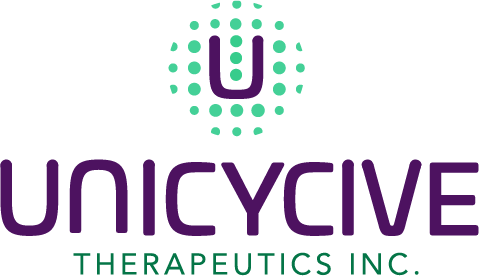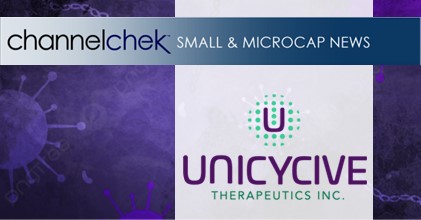
Research News and Market Data on UNCY
June 30, 2025 7:05am EDT Download as PDF
–Complete Response Letter (CRL) cited deficiencies previously identified at a third-party manufacturing vendor unrelated to Oxylanthanum Carbonate (OLC)
–No other concerns stated, including pre-clinical, clinical, or safety data
–The Company identified a second manufacturing vendor that has already produced OLC drug product, which could also be used to support the resolution of the Clinical Manufacturing and Controls (CMC) issues identified in the CRL
–The Company plans to immediately request a Type A meeting with the FDA to align on next steps
–Unicycive currently has an unaudited cash balance of approximately $20.7 million, with cash runway currently expected into the second half of 2026
LOS ALTOS, Calif., June 30, 2025 (GLOBE NEWSWIRE) — Unicycive Therapeutics, Inc. (“Unicycive” or the “Company”) (Nasdaq: UNCY), a clinical-stage biotechnology company developing therapies for patients with kidney disease, today announced that the U.S. Food and Drug Administration (FDA) has issued a CRL for its New Drug Application (NDA) for OLC to treat hyperphosphatemia in patients with chronic kidney disease (CKD) on dialysis.
“We plan to immediately seek a Type A meeting with the Agency to gain alignment on the best strategy to ensure rapid resolution of the CRL,” said Shalabh Gupta, M.D., Chief Executive Officer of Unicycive. “With a second manufacturing vendor identified that has produced OLC drug product, we remain optimistic about our ability to bring this promising new treatment option to patients with CKD on dialysis who are managing hyperphosphatemia, and we plan to provide an update as soon as we have additional clarity on next steps from the FDA.”
After submitting the NDA, and as a part of the application review and routine information requests, the FDA notified Unicycive that a third-party manufacturing vendor of its main contract development and manufacturing organization (CDMO) was cited for deficiencies following a cGMP inspection. This citation is unrelated to OLC. Unicycive also notes that as part of the NDA review, the Agency has not highlighted any other technical concerns related to the submitted CMC documentation or testing of OLC itself.
As part of its overall manufacturing strategy, the Company had previously identified a back-up third-party manufacturing vendor to build redundancy into its supply chain. The second vendor has a long history of successful FDA and international regulatory inspections and has already produced OLC drug product, which could also be used to support the resolution of the CMC issues identified in the CRL.
About Oxylanthanum Carbonate (OLC)
OLC is an investigational oral phosphate binder that leverages proprietary nanoparticle technology to deliver high phosphate binding potency, reducing the number and size of pills that patients must take to treat hyperphosphatemia in patients with chronic kidney disease (CKD) on dialysis. Its potential best-in-class profile may have meaningful patient adherence benefits over currently available treatment options as it requires a lower pill burden.
Unicycive is seeking FDA approval of OLC via the 505(b)(2) regulatory pathway. The NDA submission package is based on data from three clinical studies (a Phase 1 study in healthy volunteers, a bioequivalence study in healthy volunteers, and a tolerability study of OLC in CKD patients on dialysis), multiple preclinical studies, and the chemistry, manufacturing and controls (CMC) data. OLC is protected by a strong global patent portfolio including issued patents on composition of matter with exclusivity until 2031, and with the potential for patent term extension until 2035.
About Hyperphosphatemia
Hyperphosphatemia is a serious medical condition that occurs in nearly all patients with End Stage Renal Disease (ESRD). Annually there are over 450,000 individuals in the U.S. that require medication to control their phosphate levels.1 Uncontrolled hyperphosphatemia is strongly associated with increased death and hospitalization for CKD patients on dialysis. Treatment of hyperphosphatemia is aimed at lowering serum phosphate levels via two means: (1) restricting dietary phosphorus intake; and (2) using, on a daily basis, and with each meal, oral phosphate binding drugs that facilitate fecal elimination of dietary phosphate rather than its absorption from the gastrointestinal tract into the bloodstream.
About Unicycive Therapeutics
Unicycive Therapeutics is a biotechnology company developing novel treatments for kidney diseases. Unicycive’s lead investigational treatment is oxylanthanum carbonate, a novel phosphate binding agent currently under review by the U.S. Food and Drug Administration (FDA) for the treatment of hyperphosphatemia in patients with chronic kidney disease who are on dialysis. Unicycive’s second investigational treatment UNI-494 is intended for the treatment of conditions related to acute kidney injury. It has been granted orphan drug designation (ODD) by the FDA for the prevention of Delayed Graft Function (DGF) in kidney transplant patients and has completed a Phase 1 dose-ranging safety study in healthy volunteers. For more information, please visit Unicycive.com and follow us on LinkedIn and X.
Forward-Looking Statements
Certain statements in this press release are forward-looking within the meaning of the Private Securities Litigation Reform Act of 1995. These statements may be identified using words such as “anticipate,” “believe,” “forecast,” “estimated” and “intend” or other similar terms or expressions that concern Unicycive’s expectations, strategy, plans or intentions. These forward-looking statements are based on Unicycive’s current expectations and actual results could differ materially. There are several factors that could cause actual events to differ materially from those indicated by such forward-looking statements. These factors include, but are not limited to, clinical trials involve a lengthy and expensive process with an uncertain outcome, and results of earlier studies and trials may not be predictive of future trial results; our clinical trials may be suspended or discontinued due to unexpected side effects or other safety risks that could preclude approval of our product candidates; risks related to business interruptions, which could seriously harm our financial condition and increase our costs and expenses; dependence on key personnel; substantial competition; uncertainties of patent protection and litigation; dependence upon third parties; and risks related to failure to obtain FDA clearances or approvals and noncompliance with FDA regulations. Actual results may differ materially from those indicated by such forward-looking statements as a result of various important factors, including: the uncertainties related to market conditions and other factors described more fully in the section entitled ‘Risk Factors’ in Unicycive’s Annual Report on Form 10-K for the year ended December 31, 2024, and other periodic reports filed with the Securities and Exchange Commission. Any forward-looking statements contained in this press release speak only as of the date hereof, and Unicycive specifically disclaims any obligation to update any forward-looking statement, whether as a result of new information, future events or otherwise.
1Flythe JE. Dialysis-Past, Present, and Future: A Kidney360 Perspectives Series. Kidney360. 2023 May 1;4(5):567-568. doi: 10.34067/KID.0000000000000145. Epub 2023 Jun 29. PMID: 37229723; PMCID: PMC10371371.
Investor Contact:
Kevin Gardner
LifeSci Advisors
kgardner@lifesciadvisors.com
Media Contact:
Rachel Visi
Real Chemistry
redery@realchemistry.com

Source: Unicycive Therapeutics, Inc.
Released June 30, 2025


